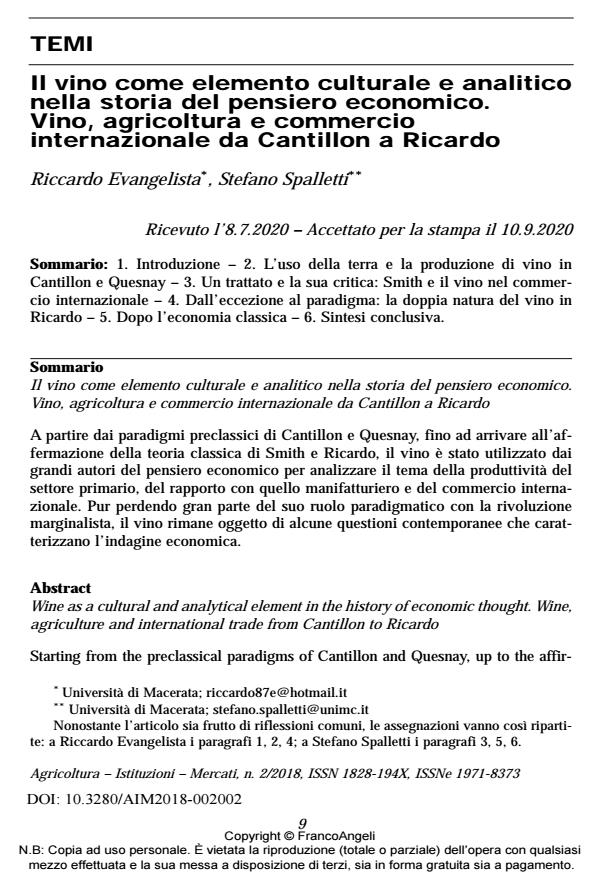Wine as a cultural and analytical element in the history of economic thought. Wine, agriculture and international trade from Cantillon to Ricardo
Journal title AGRICOLTURA ISTITUZIONI MERCATI
Author/s Riccardo Evangelista, Stefano Spalletti
Publishing Year 2021 Issue 2018/2
Language Italian Pages 18 P. 9-26 File size 79 KB
DOI 10.3280/AIM2018-002002
DOI is like a bar code for intellectual property: to have more infomation
click here
Below, you can see the article first page
If you want to buy this article in PDF format, you can do it, following the instructions to buy download credits

FrancoAngeli is member of Publishers International Linking Association, Inc (PILA), a not-for-profit association which run the CrossRef service enabling links to and from online scholarly content.
Starting from the preclassical paradigms of Cantillon and Quesnay, up to the affirmation of the classical theory of Smith and Ricardo, wine has been used by the great authors of economic thought to analyze the issue of productivity in the primary sector, in the relationship with the manufacturing sector and in international trade. While losing much of its paradigmatic role with the marginalist revolution, wine remains the object of some contemporary issues that characterize economic investigation.
Keywords: Wine, history of economic thought, Cantillon, Ricardo.
- Beccaria C. (1854) [1804], Elementi di economia pubblica, Le Monnier, Firenze.
- Cantillon R. (1955) [1755], Saggio sulla natura del commercio in generale, Einaudi, Torino.
- Chaikind S. (2012), «The Role of Viticulture and Enology in the Development of Economic Thought: How Wine Contributed to Modern Economic Theory», Journal of Wine Economics, 7, 2: 213-225.
- De Vivo G. (2017), «Whatever Happened to Ricardo’s Theory of Value? Mill, McCulloch, and the Case of “oak-trees” and “wine”», Contributions to Political Economy, 36, 1.
- Dimand R. W. (2019), «Adam Smith on Portuguese wine and English cloth», The European Journal of the History of Economic Thought, 25, 6.
- Dumas A. (2004) [1873], Il grande dizionario di cucina, Sellerio, Palermo, 2004.
- Findlay R. (1984), «Growth and Development in Trade Models», in Handbook of International Economics, vol. 1, Elsevier, Amsterdam.
- Galbraith J. K. (2016) [1991], Storia dell’economia, Rizzoli, Milano.
- Gramsci A. (1994), Scritti di economia politica, a cura di F. Frosini, Bollati Boringhieri, Torino.
- Hume D. (1971), «Sulla politica commerciale», in Opere, vol. II, Laterza, Roma-Bari.
- Jevons W.S. (1881), «Richard Cantillon and The Nationality of Political Economy», Contemporary Review, XXXIX, January/June.
- Lekachman R. (1981), Storia del pensiero economico, FrancoAngeli, Milano.
- Marx K. (1996) [1867], Il capitale. Critica dell’economia politica, Newton Compton, Roma.
- Mccloskey D. (1988), La retorica dell’economia, Einaudi, Torino.
- Mirabeau V. R. (1756), L’ami des hommes, Chrétien Hérold, Avignon.
- Napoleoni C. (1970), Smith Ricardo Marx, Bollati Boringhieri, Torino.
- Nye John V.C. (2007), War, Wine, and Taxes: The Political Economy of Anglo-French Trade, 1689-1900, Princeton University Press.
- Perrotta C. (2018), Unproductive Labour in Political Economy: The History of an Idea, Routledge, London.
- Postlethwayt M. (1751-1755), Universal dictionary of trade and commerce, W. Strahan, London.
- Quesnay F. (2001), «Massime generali del governo economico», in Miglio B. (a cura di), I fisiocratici, Laterza, Roma-Bari.
- Ricardo D. (1976), Sui principi dell’economia politica e della tassazione, Isedi, Milano.
- Schumpeter J. (1954), History of Economic Analysis, Oxford University Press, New York.
- Senior Nassau W. (1830), Three Lectures on the Rate of Wages. Delivered Before the University of Oxford, in Easter Term 1830, Murray, London.
- Smith A. (1973) [1776], Indagine sulla natura e la causa della ricchezza delle nazioni, ISEDI, Milano.
- Thornton M. (2007), «Was Richard Cantillon a Mercantilist?», Journal of the History of Economic Thought, 29, 4.
- Van der Berg R, Steenge A.E. (2012), «Cantillon, Mirabeau and Quesnay on the production and trade of wine», Enometrica, 5, 2.
- Zagari E. (1984), Mercantilismo e fisiocrazia: la teoria e il dibattito, ESI, Napoli.
Riccardo Evangelista, Stefano Spalletti, Il vino come elemento culturale e analitico nella storia del pensiero economico. Vino, agricoltura e commercio internazionale da Cantillon a Ricardo in "AGRICOLTURA ISTITUZIONI MERCATI " 2/2018, pp 9-26, DOI: 10.3280/AIM2018-002002